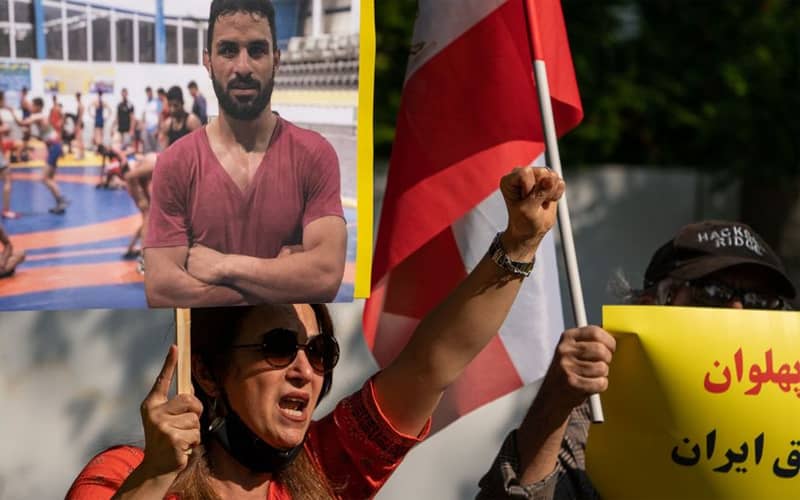
By Pooya Stone
Last Saturday, the Iranian judiciary carried out the execution of Navid Afkari, the celebrated champion wrestler who had become the subject of numerous domestic and international appeals after the news broke that his dual death sentences had been upheld despite evidence that his murder conviction was based on a false confession elicited under torture. In the days following his hanging, international appeals have continued but have begun to shift focus toward international sports authorities and other entities that are in a position to impose sanctions on the government for this defiance of basic human rights standards.
On Tuesday, a German sports organization known as Athleten Deutschland issued a statement calling for Iran to be formally banned from the Olympic Games that are scheduled to take place next summer. That statement echoes a number of appeals that had been issued while Afkari’s execution was still pending, in hopes that the International Olympic Committee would unequivocally commit to this outcome and pressure Tehran to not move forward with the death sentence.
On one hand, the IOC officials did contribute to the advance appeals to spare Afkari’s life. But on the other hand, they stopped short of a firm commitment, then specifically indicated in the wake of the execution that Iran would not face serious consequences at their hands. The IOC has taken the official position that Iran’s exclusion would unfairly punish individual athletes who compete under the Iranian flag, effectively holding them accountable for their residence in a theocratic dictatorship that they may very well oppose.
But Athleten Deutschland and other advocates for Navid Afkari have dismissed these excuses, noting that those athletes could still be given the opportunity to compete under a neutral flag, or as part of other national teams. Over the years, a number of Iranian competitors have left their national team on their own accord, in the midst of disputes related to a number of issues that violate international sports authorities’ bylaws and principles. Yet these decisions have rarely been made in response to disciplinary action from those authorities themselves.
A number of commentators have now pointed to patterns of inaction as likely contributing factors in the international community’s inability to influence Iran’s decisions in the Afkari case. Christopher Becker, a sports reporter for the Frankfurter Allgemeine Zeitung, said that organizations like FIFA and the IOC should have “enforced their rules long ago,” and that if they had, “there would have been a chance to use influence” in subsequent disputes related to Iran’s mistreatment of its own athletes.
As it stands, the lack of enforcement is apparently so prevalent that Iranian authorities fell comfortable challenging rare instances of exclusion from international competition, even in the midst of a highly visible backlash against actions that could have resulted in more of the same. On Wednesday, Deutsche Welle reported that the Switzerland-based Court of Arbitration for Sport had begun hearing an appeal from the Iran Judo Federation over a ban imposed by the International Judo Federation in October 2019.
That ban relates to the frequent trend of Iranian athletes being pressured by their own governments to intentionally lose matches or withdraw from competition under false pretenses in order to comply with a longstanding but unwritten rule against Iranian athletes engaging in friendly competition with Israeli opponents. Last year’s inciting incident involved a judo practitioner named Saeed Mollaei, who succumbed to pressure by deliberately losing a semi-final match, but then fled from his team and relocated to Germany in hopes of competing under circumstances of freedom.
Wednesday’s report named Mollaei as one of three Iranian competitors who were slated to testify at the CAS, alongside several other witnesses. Collectively, they appear to offer clear-cut evidence for the legitimacy of the ban, making the IJF’s reinstatement extremely uncertain unless international organizers decide for some reason to adopt a softer approach to enforcing their rules. This is perhaps made less likely by the international furor over Afkari’s execution, although that conclusion is also called into question by the apparent aversion to serious action by organizations like the IOC.
That question is further amplified by the long history of what one former international soccer player, Craig Foster, criticized as a “well-worn path of soft diplomacy and behind-closed-doors conversations” regarding Iranian violations of rules for international competition. FIFA, the world’s soccer authority, has repeatedly come under fire for issuing warnings and deadlines to the Islamic Republic regarding its ban on female attendance in stadiums, only to allow those deadlines to lapse without consequence.
Many rights activists both inside Iran and throughout the world have insisted that Iran’s national soccer and volleyball teams should be immediately subjected to similar bans as its judo federation. And now, with Afkari’s high-profile execution, those demands are sure to proliferate with respect to these and all other sports in which Iran competes internationally. Yet even in spite of an incident that is widely regarded as a transparent violation of human rights principles, there is reason to believe that those appeals will continue to face resistance from the powers that be.


